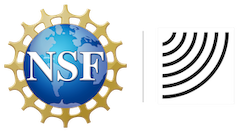2018 Winners
The LIGO Laboratory is pleased to announce that Derek Davis of Syracuse University and T.J. Massinger of Caltech have been selected to receive the inaugural (2018) LIGO Laboratory Award for Excellence in Detector Characterization and Calibration.

Derek Davis is currently a Ph.D. student at Syracuse University. As a part of the LIGO Scientific Collaboration, they serve as the Event Validation Lead for the LIGO Detector Characterization group, leading follow-up investigations of candidate gravitational-wave detections. They are interested in exploring how instrumental knowledge of the LIGO interferometers can be used to improve gravitational-wave analyses. In their free time, they enjoy baking and exploring nature. (Syracuse University)

T.J. Massinger is currently a postdoctoral scholar at Caltech. Within the LIGO Detector Characterization group, he serves as instrument science lead and as a liaison to the compact binary coalescence data analysis working group. He earned his Ph.D in 2016 working with Peter Saulson at Syracuse University. His research interests focus on the exploring the interface between instrumental noise and searches for gravitational waves. In his spare time, he enjoys going camping and playing with his lazy cats. (Caltech/MIT/LIGO Lab/K. Blackburn)
Derek Davis and Dr. T.J. Massinger are given this year's award for their work "producing the well-characterized and cleaned dataset used for astrophysical searches during the second observing run of the world-wide gravitational wave detector network."
Their concerted efforts ensured the LIGO detectors achieved maximum sensitivity through efficient subtraction of known noise sources from the entirety of the second Advanced LIGO observing run (O2). Their work directly resulted in an improvement of up to 50% in astrophysical reach in searches for gravitational wave signals from the coalescence of neutron star binaries [1]. In addition, their tireless effort in diagnosing and removing noise transients caused by non-astrophysical sources throughout the Advanced LIGO era reduced the confusion between astrophysical gravitational wave events and noise background, improving the measured significance of some events by over a factor of 500 [2].
Their contribution stands out as essential groundwork that allowed for at least three more confident gravitational wave signal detections during O2, and serves as an outstanding example of the detector characterization work needed to lay the groundwork for future discoveries in gravitational wave astrophysics and multi-messenger astronomy.
Derek and T.J. will share a $1000 prize as well as present invited colloquia at one of the the LIGO Laboratory sites (LIGO-Hanford, LIGO-Livingston, Caltech, or MIT) to share their accomplishments with LIGO Laboratory members.
Read more about their work:
[1] Improving the Sensitivity of Advanced LIGO Using Noise Subtraction D. Davis, T.J. Massinger, et al. arXiv preprint (2018)
[2] Effects of data quality vetoes on a search for compact binary coalescences in Advanced LIGO's first observing run The LIGO Scientific Collaboration. Classical and Quantum Gravity, 35, 6 (2018)
2018 Honorable Mention
The LIGO Laboratory is also pleased to list six other projects as meriting honorable mention:
Scotty Coughlin (Northwestern University) -- for his role in the creation of Gravity Spy (gravityspy.org), a tool for citizen-scientists to assist the collaboration in classifying non-astrophysical transients in the detector data, and for the development of computational infrastructure to allow use of Gravity Spy results in other diagnostic analyses.
Sudarshan Karki (University of Oregon) -- for the assembly, characterization, and uncertainty analysis of the photon calibrators that serve as the LIGO detectors' primary, absolute, displacement reference.
Nikhil Mukund (IUCAA) -- for the construction of tools to categorize and identify causes of detector down time, and a convenient graphical interface to display and interpret relevant diagnostic data.
Philippe Nguyen (University of Oregon) -- for his role in the assembly of the sensor array measuring the physical environment at the LIGO Hanford Observatory, and for automating the data analysis allowing assessment of the environment’s impact on candidate gravitational wave detections.
Darkhan Tuyenbayev (Academia Sinica) -- for the development and implementation of a framework for accounting for time dependence in the detectors' calibration.
Aaron Viets (University of Wisconsin-Milwaukee) -- for the construction of near-real-time tools to compensate for frequency-dependent, time-dependent changes in the detectors' calibration.



